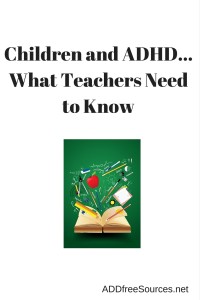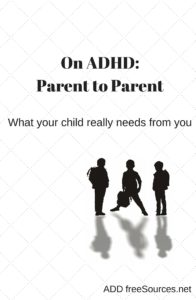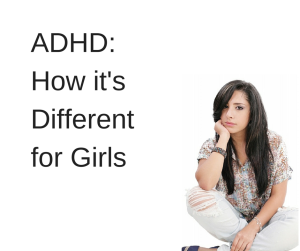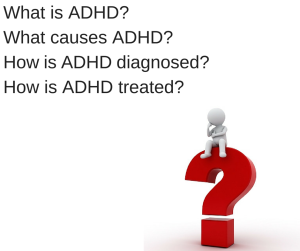 Written by Cindy Goldrich, Ed.M., ACAC
Written by Cindy Goldrich, Ed.M., ACAC
“Why doesn’t my child’s teacher ‘get it?’ ” “Why doesn’t she understand how ADHD really impacts my child – that he is not lazy, unmotivated, nor intentionally manipulative?” I know this opens up a whole set of emotions for many parents out there, so before I go any further, I must clarify two important issues.
First, teachers are individuals, each with their own background, knowledge, and experience. Unfortunately, many parents and children have had negative experiences with some teachers, but there are also many teachers who have, through their compassion, knowledge and methods, opened the door to learning and personal growth in ways that have been life changing. Most teachers go into their profession with the intention of enlightening the lives of the children they touch.
Which leads me to the second issue- Most teachers, especially general education teachers, are not specifically taught about how to recognize ADHD, or how to teach and support children with ADHD. They may receive a general overview of the symptoms, but they are not given extensive education about the many issues involved in supporting a child with ADHD.
It is this second issue that creates the greatest concern and potentially devastating impact on children. Here are some of the concerns it raises:
- ADHD involves a great deal more than impulsivity, hyperactivity, and inattentiveness. It impacts many areas of learning, including their ability to manage their materials, time, emotions, and productivity. Without a full understanding of how ADHD is impacting the specific child in the classroom, a teacher might, unknowingly or unintentionally, make assumptions that are false about that child.
- According to the Centers for Disease Control and Prevention, approximately 9.5% or 5.4 million children 4-17 years of age have ADHD. By and large, these children are in the regular education classes. That means that each regular education class probably has at least one child with ADHD in the classroom.
- Along with ADHD, there are often co-existing conditions which can complicate the learning in ways that a teacher may not realize. For example, depression and anxiety may be playing a role in the child’s life and this may not appear evident in the classroom.
- Many parents look to their children’s teachers for advice and guidance regarding their children’s development and education. In fact, a recent survey conducted by Parents Magazine and The Child Mind Institute found that a staggering 83% of parents said that they would want their child’s teacher to tell them if he thought their child should be evaluated for a psychiatric or learning disorder. (Parents Magazine, May 2012, “Attitudes About Children’s Mental Health”). While experienced teachers may be in a position to notice atypical behavior or performance in a child, without the proper knowledge or training, they must tread very lightly in what and how they communicate to a parent. Their observations are helpful, in fact, they are a valuable component to the diagnostic process. However, they must make it clear to any parent that they are NOT qualified to diagnose, and that their observations are within the limited scope of the classroom.
I propose two specific remedies. The first involves you, the parents of these magnificent children. As you approach your teacher to discuss your child, keep in mind the following: This is the person who is with your child each and every school day. Empathize with the fact that they are responsible for managing and supporting not just your child, but also a whole classroom of children. Even if you suspect otherwise, approach them with the attitude that they want to help and that you value their insights. However, although they may have the best intentions, they may not yet understand how to help your child, and in fact, may be unknowingly frustrating, alienating and perhaps even harming your child. If repeated experience with this teacher leads you to conclude that they are not supportive of your efforts to collaborate, then you may want to involve the guidance counselor or school principal.
The second remedy involves educating the teacher. For many parents, this is a real awakening – the recognition and acceptance that, for better or worse, your child’s teacher does not really know how to best help your child. So much of what we know about ADHD and how to treat it effectively we learned within the last decade. You as the parent have had to become an expert in ADHD and your child. With due respect, and without judgment, request to share with the teacher some of the knowledge, tools and strategies you have learned. There are wonderful written resources available that you can share with your teacher, but no one besides you can create the shift and reframing necessary for your teacher to see your child through the lens of compassion and insight about the challenges your child faces like you, the parent, can.
Invite them to ask you for insights about behavior that may seem frustrating or illogical. You must help the teacher understand why certain accommodations and modifications are truly beneficial. For example, having “note taking” as a goal may be more frustrating than helpful at certain stages of development. Providing a set of class notes for your child allows him to focus on the teacher since his working memory makes the act of writing while listening too challenging. If appropriate, you can explain the impact medication has on your child (for example, that perhaps your child isn’t ready to eat during lunch but may really benefit from a power snack around 2 pm as the meds wear off, or the fact that the end of the day might be particularly challenging for your child to learn new material or remember to pack up properly).
For a true, systemic change to take place in the education of children with ADHD, we will need our teaching colleges to mandate a more in depth training of new general education teachers regarding the latest research on ADHD and the best practices for teaching and supporting these children. We also need our current teachers to be provided with in-service training regarding the same. (Note from author: I personally welcome the opportunity to speak to any group of current or future teachers who will have me. Located near New York, NY)
ADHD is a neurobiological disorder. It is not an excuse for poor behavior, and it is not the result of poor parenting. Yet, unfortunately, I still hear many stories from children and parents that their teachers do not “believe” or “understand” that the challenges the children face in the classroom and with homework are not fully under the child’s control. If they could… they would
Keep in mind – kids do well IF THEY CAN. If not, it’s up to the adults in their world to help them figure out why and to help them succeed – either by helping the children develop the skills, or modifying the expectations or environment until they can. Teachers are on the frontline of education – we must ensure that they are well equipped with knowledge, skills and strategies to support all children.
Here is a list a list of things you may want to help your teacher know.
12 Things Teens with ADHD would like their Teachers to know
by Eileen Bailey
1) I forget things, even important things.
2) I am not stupid
3) Please be patient
4) I really do want to do well.
5) I do complete my homework.
6) ADHD is not an excuse
7) I need help to succeed.
8) If you notice me acting in inappropriate ways, please talk with me in private. Please do not talk to me in front of the class.
9) I don’t like having “special accommodations” in the classroom. Sometimes they are needed to help me succeed and do well. But that doesn’t mean that I like it. Please don’t call attention to any special treatment in front of other students. Please do not draw attention to my ADHD.
10) Detailed explanations of your expectations will help me. I work best when I know exactly what you expect from me.
11) Learning about ADHD is one of the best ways to help me.
12) Although I have ADHD, I am not ADHD. I am a person; I have feelings, hopes, and expectations. I have needs. I want to be liked and accepted. I want to feel good about myself. All of this is important to me. Sometimes I act out to hide my embarrassment or shame. This does not mean that something is not important; on the contrary, it means that it is very important and I am hiding my disappointment that I failed.
Written by Cindy Goldrich, Ed.M., ACAC © 2012 PTS Coaching. All rights reserved. Articles may be reproduced or electronically distributed as long as attribution to PTS Coaching is maintained. (Link works) http://www.ptscoaching.com
“Image courtesy of KROMKRATHOG/FreeDigitalPhoto.com” Modified on Canva
Follow ADHD / ADD freeSources’ board For Teachers – ADHD, LD, and Executive Functions on Pinterest.
Follow ADHD / ADD freeSources’ board School Strategies for ADHD on Pinterest.
Follow ADHD / ADD freeSources’ board Self-Advocacy for Students on Pinterest.





